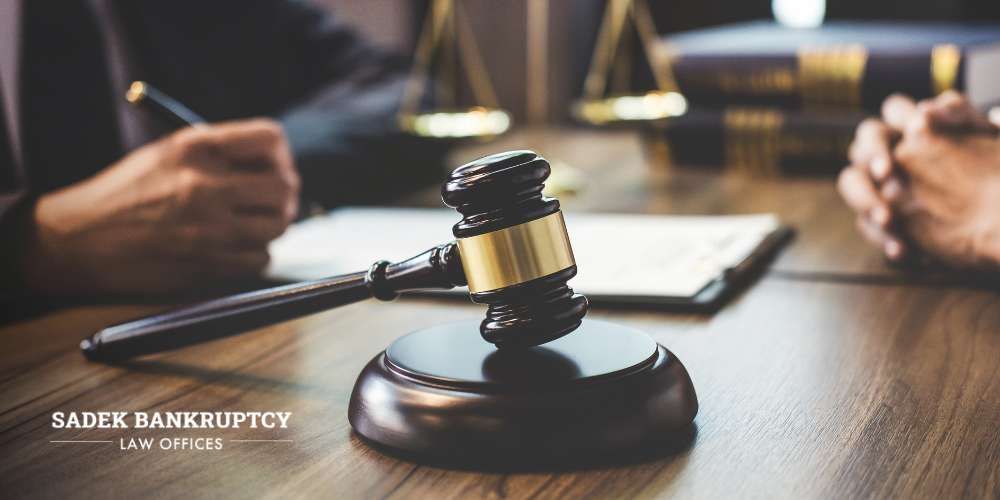What Is a 341 Meeting?
A 341 meeting, also known as the meeting of creditors, is a big part of any Pennsylvania bankruptcy proceeding. When you file for bankruptcy, the bankruptcy trustee assigned to your case will call this meeting. It’s where creditors and other interested parties can ask you questions about the information in your bankruptcy petition and other documents. It’s a chance to review your bankruptcy paperwork in detail and make sure all assets and liabilities are listed correctly.
At Sadek Bankruptcy Law Offices, we know how confusing bankruptcy can be. From preparing your bankruptcy papers to representing you at the 341 meeting, we’re here to assist you every step of the way.
If you’re going through the bankruptcy process in Pennsylvania and need legal guidance, our trusted bankruptcy attorneys can help. Call (215) 545-0008 or contact us online to schedule a free case evaluation today.
When Does the 341 Meeting Occur?
The 341 meeting, named after Section 341 of the Bankruptcy Code, is a hearing that usually takes place about 20 to 40 days after the debtor files their bankruptcy petition with the bankruptcy court.
After submitting the necessary bankruptcy paperwork, the court sends a notice to all involved parties, including creditors, with details on the date, time, and location of the hearing. The bankruptcy trustee conducts the hearing, and a judge will not be present.
The 341 meeting allows the bankruptcy trustee to review the debtor’s financial situation and ask questions regarding their bankruptcy filing, assets, and debts.
It’s important that the debtor, along with their attorney, attends the meeting. Having the debtor’s attorney present is important because they act as the debtor’s representative and protects their interests.
How Long Does a 341 Meeting Last?
A 341 meeting generally lasts between 10 and 20 minutes, depending on the details of the bankruptcy case. During this time, the bankruptcy trustee will ask the debtor a series of standard questions regarding their bankruptcy petition, assets, debts, and bankruptcy paperwork. Creditors may also attend the meeting and ask questions, though this is uncommon.
While the meeting is relatively brief and often completed within the same hour it begins, debtors need to be fully prepared. You should bring the required documents, such as tax returns and a social security card or social security number, to ensure the meeting proceeds smoothly without delays.
Do Creditors Show Up at the 341 Meeting?
While creditors have the right to attend 341 meetings, it’s rare for them to actually show up. The creditors meeting is mainly conducted by the bankruptcy trustee, who asks the debtor questions about their bankruptcy filing, assets, debts, and other financial matters.
The creditor may attend if they have concerns about the bankruptcy case or want to gather further information about the debtor’s assets and ability to pay back debts. In most cases, however, creditors rely on the bankruptcy trustee to conduct the meeting and review the bankruptcy paperwork, leaving their attendance unnecessary.
Regardless of whether creditors attend, it is still important for debtors to be prepared to answer questions truthfully and accurately.
341 Meeting Questions and Examples
During a 341 meeting, the bankruptcy trustee will ask several questions to verify the accuracy of the bankruptcy paperwork and ensure that all assets and debts have been properly disclosed. Here are a few examples of questions you can expect:
- Is the address on the petition your current address?
- Have you reviewed the bankruptcy petition and other documents filed with the court, and are they correct?
- Did you list all of your assets, property, and debts in your bankruptcy filing?
- Have you recently sold, transferred, or given away any property prior to filing for bankruptcy?
- Do you expect to receive any money, such as an inheritance, lawsuit settlement, or insurance payout, in the near future?
- Did you file your tax returns for the past few years?
- Are the debts listed in your bankruptcy filing accurate and complete?
These standard questions help the bankruptcy trustee confirm that the facts stated in the debtor’s bankruptcy case are truthful and that there are no hidden assets or undisclosed information.
While these are just a few examples, the specific questions asked may vary depending on the details of the bankruptcy case. You should answer each question fully and honestly to avoid complications in the bankruptcy proceeding.
What Happens After the Meeting of Creditors?

After the meeting of creditors, the bankruptcy process continues with the court reviewing the information presented. If there are no objections or outstanding issues from creditors or other interested parties, the bankruptcy case will move forward.
The debtor may need to provide additional documents or clarify information, but typically, the next steps involve waiting for the bankruptcy court to process the case. If the debtor complies with all requirements and no further hearings are necessary, the case will proceed toward discharge.
For Chapter 7 bankruptcy cases, your debt could be discharged within a few months, while Chapter 13 cases will continue under the already established repayment plan. To keep the process moving smoothly, it’s important to stay in communication with your Pennsylvania bankruptcy attorney and respond to any requests for further information during this period.
What Does the Bankruptcy Trustee Do After the 341 Meeting?
A bankruptcy trustee is a person appointed to manage and oversee a debtor’s bankruptcy case. After the 341 meeting, the trustee continues to review all the information provided, verifies the accuracy of the bankruptcy filing, and may handle the sale of non-exempt assets to repay creditors in a Chapter 7 case. In Chapter 13 bankruptcy cases, the trustee administers the repayment plan agreed upon by the debtor and creditors.
Bankruptcy trustees and administrators are appointed by the United States Trustee’s Office, a division of the Department of Justice. This office selects and supervises trustees to make sure that bankruptcy cases are handled correctly and fairly.
When a bankruptcy case is filed, a United States Trustee or a bankruptcy administrator monitors the case and the actions of all parties involved. Bankruptcy administrators perform this role only in Alabama and North Carolina. A bankruptcy trustee takes on these responsibilities in all other states, including Pennsylvania.
What If the 341 Did Not Go Well?
If your 341 meeting didn’t go as planned, there are several things that might happen based on the concerns raised by the bankruptcy trustee or creditors. Common issues include incomplete bankruptcy paperwork, missing important documents like tax returns or your social security card, or inconsistencies in the information you provided during the meeting.
If the trustee has questions about your assets, debts, or overall financial situation, they might ask for additional documents, schedule another meeting, or set a new effective date for the next steps.
In some cases, the bankruptcy trustee may ask you to update or correct your bankruptcy petition or schedules to fix any mistakes. If you don’t resolve these issues on time, the trustee might recommend your bankruptcy case be dismissed, which means you won’t get the debt relief you’re seeking.
However, most problems that come up during a 341 meeting can be handled by the debtor’s attorney. A knowledgeable bankruptcy attorney can guide you through the necessary steps to fix any issues and keep your bankruptcy proceeding moving forward.
How Long After the Meeting of Creditors Is a Car Repossessed?
A car can be repossessed after the 341 meeting, depending on your bankruptcy case and the status of your car loan.
In a Chapter 7 bankruptcy, if you’re behind on payments and don’t reaffirm or redeem the loan, the lender may begin the repossession process shortly after the meeting of creditors. This could happen within a few weeks, depending on the lender’s actions and whether you can bring the loan current.
In a Chapter 13 bankruptcy, the car is usually protected under your repayment plan, but if you miss payments, the lender may seek permission from the court to repossess the vehicle. The timing depends on how quickly the court approves the lender’s request. It’s important to stay current on payments to avoid repossession.
How Long After the 341 Meeting Until I Receive My Discharge?

The time it takes to receive a discharge depends on the type of bankruptcy filed. In a Chapter 7 case, the discharge typically occurs about 60 to 90 days after the 341 meeting, provided there are no complications or objections.
In a Chapter 13 bankruptcy case, the discharge is granted after successfully completing the repayment plan, which usually takes three to five years. It’s important to comply with all bankruptcy requirements and respond to any requests for additional information to avoid delays.
341 Meeting FAQs
Can I Buy a Car After 341 Meeting?
Yes, you can buy a car after your 341 meeting, but the timing and process will depend on your specific bankruptcy case. In Chapter 7 bankruptcy, once the 341 meeting is complete and your debts are discharged, you may be able to purchase a car if your financial situation allows.
However, until the discharge is granted, your financial decisions may still be subject to scrutiny by the bankruptcy trustee, so it’s important to proceed carefully and ensure any purchase aligns with your overall bankruptcy filing.
Buying a car in a Chapter 13 bankruptcy may be more complex, as you are still under the repayment plan approved by the bankruptcy court. If you must purchase a vehicle while still in Chapter 13, you typically need approval from the trustee assigned to your case. They will review your finances and ensure the purchase won’t affect your ability to meet your repayment obligations.
What Is a Presumption of Abuse After 341 Meeting?
A presumption of abuse can occur if the bankruptcy trustee determines that your financial situation suggests you have enough disposable income to repay your debts, making Chapter 7 bankruptcy unnecessary.
This presumption is based on the means test, which compares your income to the median income for your household size. If you fail the means test, it could be presumed that you’re abusing the Chapter 7 process, and you may need to switch to a Chapter 13 repayment plan instead.
If a presumption of abuse is raised, it’s important to consult with your attorney and ensure compliance with the U.S. bankruptcy code and Pennsylvania bankruptcy laws.
How Far Back Does the Bankruptcy Trustee Look in a Bankruptcy Filing?
The bankruptcy trustee can examine financial records and transactions from the past two years before the bankruptcy filing. Sometimes, the trustee can look even further back, depending on the type of transactions being examined, such as large property transfers or potential fraud.
The trustee’s goal is to ensure that all assets, debts, and financial activities have been properly disclosed to the court and that the debtor hasn’t attempted to hide or transfer assets to avoid paying creditors.
Contact Sadek Law for Help With Your Pennsylvania Bankruptcy Proceeding
If you are going through bankruptcy and need reliable guidance, Sadek Bankruptcy Law Offices in Pennsylvania is here to help.
Our experienced attorneys can guide you through every step, including preparing for your 341 meeting. Whether you’re seeking debt relief through Chapter 7 or Chapter 13 bankruptcy, we will ensure your rights are protected and provide the support you need to achieve a fresh financial start.
Call (215) 545-0009 or contact us online to schedule a free consultation today.





